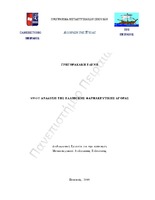SWOT ανάλυση της ελληνικής φαρμακευτικής αγοράς
A SWOT analysis of the Greek pharmaceutical market

Προβολή/
Θεματική επικεφαλίδα
Φαρμακευτική πολιτική -- Ελλάδα ; Φαρμακευτική βιομηχανία και εμπόριο -- Κυβερνητική πολιτική -- Ελλάδα ; Φάρμακα -- Τιμές -- Δίκαιο και νομοθεσία -- Ελλάδα ; Φαρμακευτική βιομηχανία και εμπόριο -- Οικονομικές απόψεις ; Pharmaceutical policy -- Greece ; Pharmaceutical industry -- Government policy -- Greece ; Pharmaceutical industry -- Economic aspects ; Drugs -- Prices -- Law and legislation -- GreeceΠερίληψη
Η φαρμακευτική αγορά χαρακτηρίζεται από μια σειρά ιδιαιτεροτήτων, απόρροια της δομής και του τρόπου λειτουργίας της. Έννοιες όπως η ασύμμετρη πληροφόρηση, η σχέση αντιπροσώπευσης, οι μονοπωλιακές συνθήκες λειτουργίας, ο καταμερισμός της ζήτησης και το παράλληλο εμπόριο σε συνδυασμό με το υψηλό κόστος παραγωγής των φαρμακευτικών προϊόντων διαμορφώνουν ένα μοναδικό πλαίσιο λειτουργίας για τον κλάδο, μέσα σε ένα κλίμα ευρύτερου δημοσιονομικού περιορισμού που επιβάλλει περιστολή της φαρμακευτικής δαπάνης. Όλες οι προσπάθειες χάραξης κοινής ευρωπαϊκής πολιτικής στον τομέα του φαρμάκου έχουν εξαντληθεί αποκλειστικά πάνω στο θέμα της έγκρισης της άδειας κυκλοφορίας μέσω της κεντρικής διαδικασίας και της διαδικασίας αμοιβαίας αναγνώρισης. Από το σημείο αυτό και μετά κάθε κράτος έχει θεσμοθετήσει τις δικές του διαδικασίες ελέγχου της τιμολόγησης, της αποζημίωσης των φαρμακευτικών προϊόντων και ευρύτερα του τρόπου λειτουργίας της φαρμακοβιομηχανίας. Η φαρμακευτική πολιτική στην Ελλάδα διαμορφώνεται από το Υπουργείο Υγείας και Κοινωνικής Αλληλεγγύης. Τα υψηλά επίπεδα κερδοφορίας, το άριστα καταρτισμένο προσωπικό, οι επιτυχείς στρατηγικές αποτελεσματικότητας των εσωτερικών της λειτουργιών και η γεωγραφική της θέση-κλειδί στα Βαλκάνια είναι μερικά μόνο από τα δυνατά σημεία της ελληνικής φαρμακευτικής αγοράς. Στην αντίπερα όχθη, οι περιορισμένες επενδύσεις για έρευνα και ανάπτυξη στην εγχώρια αγορά, η έλλειψη καθετοποίησης, ο αθέμιτος ανταγωνισμός σε όλα τα επίπεδα, οι παράλληλες αγορές, ο υψηλός βαθμός συγκέντρωσης της αγοράς και ο γιγαντισμός των μεγάλων επιχειρήσεων αποτελούν ορισμένες από τις βασικές αδυναμίες του κλάδου. Όσον αφορά στις προοπτικές που δίνονται στον κλάδο, θεωρούνται ως σημαντικότερες οι επενδύσεις σε φάρμακα βιοτεχνολογίας, η περαιτέρω ενίσχυση της ανάπτυξης των γενόσημων φαρμάκων και η γήρανση του πληθυσμού, με ο,τι αυτό συνεπάγεται για την ανάπτυξη των αντίστοιχων θεραπευτικών κατηγοριών φαρμακευτικών σκευασμάτων. Την ίδια στιγμή, η δυναμική της ελληνικής φαρμακευτικής αγοράς περιορίζεται από την έλλειψη σταθερού θεσμικού πλαισίου με συνεχείς εναλλαγές στη νομοθεσία και από την καθυστέρηση στη λήψη αποφάσεων. Βέβαια, τη σημαντικότερη απειλή συνιστά η αδυναμία ελέγχου των χρεών του ΕΣΥ, τα οποία εκτιμώνται σε €3 δις προς το φαρμακευτικό κλάδο.


